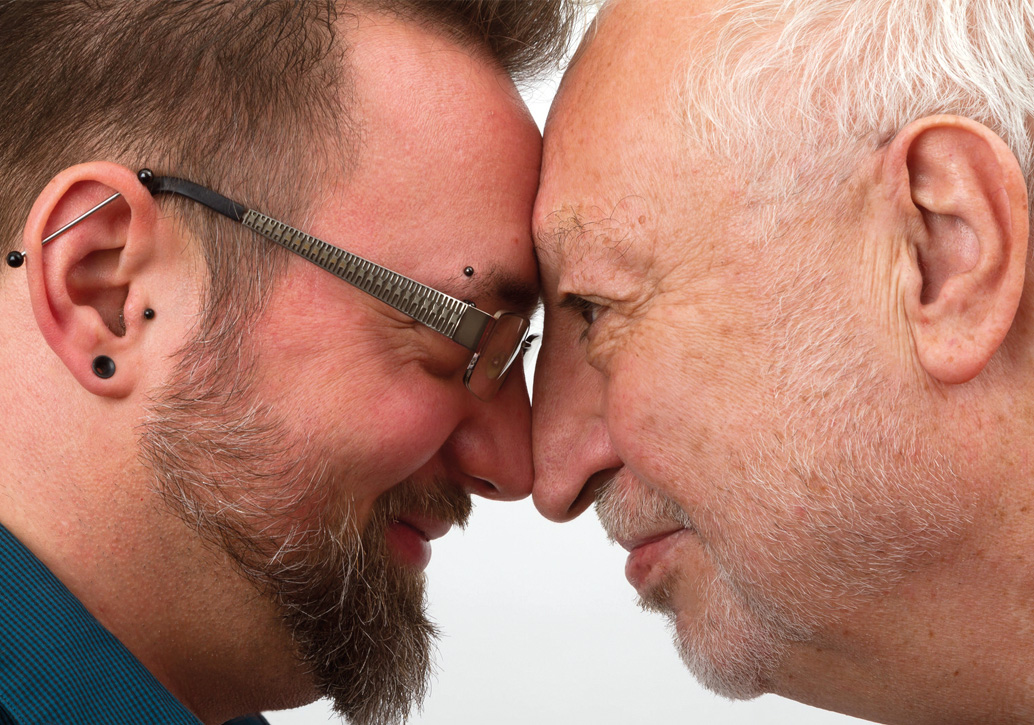For the LGBTQ Community
Like many gay men of their generation, Bob and Simon both married in their 20s and are loving fathers and grandfathers. Now, they are both in their early 80s and have been a couple for more than 40 years. Finding their three-level townhouse too much to manage, they are looking at their options for retirement communities. What challenges might this couple experience in their search for a supportive environment?
By Pat Irwin, BA, AICB, CPCA
Selecting a retirement community is complicated at the best of times, but where can Bob and Simon go to learn about potential issues and questions, and receive information and guidance?
Bob and Simon met with one of the program coordinators at The 519, a resource centre for the LGBTQ community in downtown Toronto. Together, they developed a “what-about” list to anticipate the issues they might need to consider.
Bob and Simon’s first hurdle was coming to terms with their need for care services in a retirement community. Prof. Rinaldo Walcott, chair of the Sociology and Equity Studies Department at the University of Toronto, has said that queer people tend to view themselves and their culture as eternally youthful, without considering the possibility that growing old may mean “coming out again and again in old-folks homes.”
Would community living work?
Bob and Simon expect to share a bedroom, have meals and socialize together, and generally be considered a couple. However, even if they have lived openly in the past, individuals can suddenly find that disclosing their sexual orientation or gender variance makes other residents uncomfortable.
When looking for a placement, recommendations from others in the senior gay community can be very helpful. In addition, it’s essential that a person’s sexual orientation is openly discussed when touring a community. Many retirement communities lack the awareness and training required to defuse any issues and, as Bob remarks, “It’s not up to me to educate them.” Having said that, community living requires respect from all parties.
Unique healthcare needs
Many seniors are successfully living with HIV, managed by medication and careful monitoring. Transgendered people can have other specialized health needs, such as managing the long-term effects of surgical procedures and extensive hormone use. However, most residents of a retirement community are covered by the house physician who, in all probability, will not have experience in providing support for these types of health issues. Consequently, residents with such healthcare requirements are advised to stay with their own specialists for as long as possible, and to create contingency plans with their families or friends should additional care be required.
Caregiving challenges
Accepting help is difficult for anyone, but it can be especially challenging for gay seniors who might not want to “rock the boat.” However, while it can no longer be assumed that all seniors are heterosexual, caregivers may not be as open minded as we’d like them to be.
One reported phenomenon is discrimination and lack of respect from caregivers with conservative beliefs. The children of homosexual parents often face this discrimination as well.
Marie Robertson, a Canadian LGBT+ rights activist and community developer at Ottawa’s Senior Pride Network, shares anecdotes about LGBTQ seniors in care communities. Her stories range from an elderly gay couple who felt they could only hold hands in their bathroom, to a trans woman who was brutally humiliated by a caregiver who, while helping her bathe, saw that she had a penis.
Robertson’s solution was to develop diversity training on how to be inclusive and considerate of LGBTQ residents. Her course includes a rundown of LGBTQ history and presents realistic scenarios. Robertson reports that most staff are receptive to the training and are better caregivers for it.
Substitute decision-making
One senior tells us he has lost so many friends to AIDS that he faces aging “without cohorts.” Many gay seniors do not have a spouse, children or even close family members. This can be an issue when appointing powers of attorney for care and financial matters, and for communicating advance care directives. Their options are often limited to making a law firm or trust company their power of attorney and estate executor of their will.
Loneliness and isolation
The lack of a sizeable cohort or close family members can be a recipe for isolation. Many LGBTQ seniors suffer from feelings of loneliness, isolation, depression and have thoughts of suicide, reports SAGE (sageusa.org), which offers advocacy and services to LGBTQ elders. SAGE’s research shows that high percentages of LGBTQ older adults—especially transgender people and people of colour—are dealing with mental health issues that adversely affect their quality of life.
Many LGBTQ seniors came of age when homosexuality was against the law. Many delay seeking the mental healthcare they need for fear of encountering discrimination and bias. Awareness training is the solution to having LGBTQ seniors feel more accepted and open to seeking help.
Back to Bob and Simon…
So what did Bob and Simon do? They made a wish list for their ideal residence, which included staying close to their existing support systems, such as their friends, families and medical team; having social acceptance; and a community where they could “age in place” with a continuum of care, and not have to move or be separated to receive the care they might need over time. They also agreed to book a trial stay of a full month at any potential residence before making a decision.
Their first choice was an elegant retirement home near the arts community of Toronto, close to theatres, restaurants, galleries and shops. The suite and amenities were first-rate, the food excellent and the other residents very pleasant. However the support and care staff were very unfriendly—almost rude—to Bob and Simon in particular. The men complained to the management team, who apologized but did not address the issue, leaving the couple feeling uncomfortable and unwelcome.
Their second trial stay, at the suggestion of a church friend, was a place “where all the old hippies go to retire.” The suite and common areas were less fashionable and the neighbourhood less glamorous, but the environment, staff and management were so welcoming that Bob and Simon instantly felt at home. The trial stay was a key element in making a good choice.
The ultimate experts are the men themselves. What do they say? “We’re really just an old married couple like anyone else. We feel at home here, and so do our friends, our kids and grandkids. This is what families look like now.”
Pat M. Irwin, BA, AICB, CPCA, is founder and president of ElderCareCanada, which helps seniors and their families negotiate every aspect of the eldercare journey. She is also a professor of Distance Learning at Centennial College in Toronto.
RESOURCES
Equality for Gay and Lesbians Everywhere
(“Egale”; egale.ca)
An organization advancing equality, diversity, education and justice .
The 519
(www.the519.org/programs/senior-pride-network)
A city agency and a registered charity that focuses on Service, Space and Leadership. It is committed to the health, happiness and full participation of the LGBTQ community. They are partnered with the Senior Pride Network and offer programs and workshops for senior LGBTQ individuals including drop-in centres and mature book clubs.
Singing Out
Toronto’s LGBTQ Community Chorus. The choir promotes pride in musical excellence, fosters a positive image with common goals of belonging, unity and empowerment, and engages in outreach activities.
SAGE
(www.sageusa.org)
Located in New York, it is the country’s largest and oldest organization dedicated to improving the lives of lesbian, gay, bisexual, and transgender (LGBT) older adults. SAGE works to achieve a high quality of life for LGBT older adults, supports and advocates for their rights, fosters a greater understanding of aging in all communities, and promotes positive images of LGBT life in
later years.
The Canadian Rainbow Health Coalition
(www.rainbowhealthontario.ca )
A national organization addressing the health and wellness issues of LGBTQ people.
For more details of all of these activities, visit the519.org/programs.













